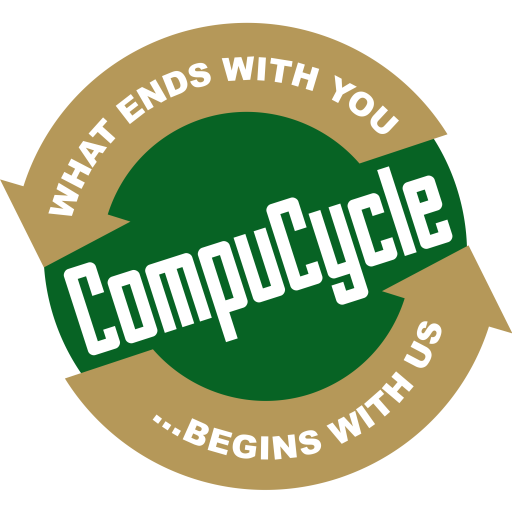
April is here, and with that comes the busiest time of year for CompuCycle! We have our annual Earth Day event approaching fast, but first, let’s dive into some Earth Day history and find out how it all began!
Did you know Earth Day marks the anniversary of the birth of the modern environmental movement in 1970? Before that, a production facility could easily produce and send into the atmosphere black clouds of smoke and just throw tons and tons of e-waste and other toxic materials into a water body of their preference, and there was nothing that anyone could do to stop it. Not even a politically powerful individual or organization could take them to court for it. Those were dark times, and our environment was completely unprotected with the absence of any kind of regulatory or legal mechanisms in place. There was no Clean Water Act. There was neither the Clean Air Act nor the EPA.

Although mainstream America largely remained oblivious to environmental concerns, the stage had been set for change by the publication of Rachel Carson’s New York Times bestseller Silent Spring in 1962. The book represented a watershed moment, selling more than 500,000 copies in 24 countries and beginning to raise public awareness and concern for living organisms, the environment, and links between pollution and public health.
Earth Day 1970 gave voice to that emerging consciousness, channeling the anti-war protest movement’s energy and putting environmental concerns on the front page.
The idea for a national day to focus on the environment came to Earth Day founder Gaylord Nelson, then a U.S. Senator from Wisconsin, after witnessing the ravages of the 1969 massive oil spill in Santa Barbara, California.
On April 22, 1970, 20 million Americans took to the streets, parks, and auditoriums to demonstrate a healthy, sustainable environment in massive coast-to-coast rallies. Thousands of colleges and universities organized protests against the deterioration of the environment. Groups fighting against oil spills, polluting factories and power plants, raw sewage, toxic dumps, pesticides, freeways, the loss of wilderness, and the extinction of wildlife suddenly realized they shared common values.
Earth Day is currently the largest secular observance globally, celebrated by more than a billion people every year, and a day of action that changes human behavior and provokes policy changes.
How Can You Help?
You can do the following things to support the cause:
- Spread as much awareness as you can about the ill effects of e-waste on the environment and public health.
- Leverage your social media to speak out against irresponsible acts of spreading e-waste and shipping it to underdeveloped countries.
- Speak about the importance of Earth Day and celebrate it to show you are dedicated to the motive behind it. Tell people about Earth Day history and its implications.
- Never throw away your used, old, or unneeded electronics in trash bins, and tell people to do the same.
- Hand over the electronic devices that you do not need anymore to credible and responsible e-recycling companies, like CompuCycle, and tell people to do the same.
- Let people know that their private data stored on their electronics can be misused if they do not opt for secure data destruction through companies like CompuCycle.
Earth Day history triggers hope among us by signifying that good is always more powerful than bad. People stood up against something that was negatively impacting the world and succeeded in getting laws and regulations made and implemented. With more and more people joining the cause to make the environment better, the earth will become greener and safer to live and breathe in. E-waste, if not properly destroyed, significantly contaminates the ecosystem.
CompuCycle not only shred electronics and disposes of them in a responsible and compliant manner but holds a policy of reusing the devices that can be repurposed. This enhances natural resource preservation and allows underprivileged communities to access technology that they otherwise cannot afford. By offering your old electronics to CompuCycle, you can be sure that all the processes they will go through are compliant with international regulations and are completely green. We are dedicated and committed to winning the fight against e-waste and hold Earth Day history close to us for motivation. You can join our efforts in creating awareness about the problem and solution and acquiring more and more people to support the cause. Remember, it is high time to act as the increasing rate of electronics production is threatening the world with an accelerated pace of the problem increase.
Today, the fight for a clean environment continues with increasing urgency, as the ravages of climate change become more manifest every day. Help us be a part of Earth Day and create many more chapters—struggles and victories—into the Earth Daybook.
Recent Articles
CompuCycle Becomes Exclusive Woman-Owned E-Waste Processor in Texas with ISO 27001 Data Security Certification
New Information Security Management System (ISMS) Certification Guarantees End-to-End Data Confidentiality and Integrity for Corporate IT Asset Disposition (ITAD). HOUSTON, TX – December 9, 2025 – CompuCycle, an industry leader in secure and sustainable IT…
Read MoreSecure Electronics Disposal in Houston: Why the City’s Largest Industries Trust CompuCycle
When a major healthcare system decommissions thousands of laptops, or an oil and gas company retires an entire data center, one question comes up again and again: What happens to all that data — and…
Read MoreCompuCycle Executives Join R2 TAC and e-Stewards Leadership Council to Advance ITAD Standards
Houston-based ITAD provider deepens its industry influence through active participation in standard-setting committees. As corporate ITAD needs evolve alongside stricter compliance and ESG requirements, CompuCycle continues to lead the way—this time by contributing directly to…
Read MoreI’m Just a Computer: A Journey Through ITAD Recycling
Meet Chip the Computer – he’s about to take you on an unforgettable journey through the world of IT Asset Disposition (ITAD). Buckle up for an adventure that’s both educational and entertaining! Chapter 1: “Hello,…
Read More


